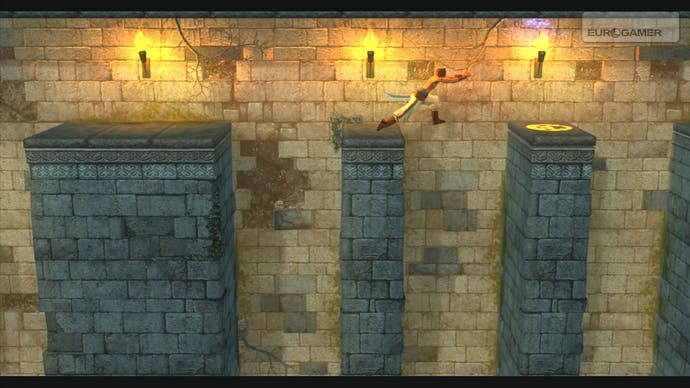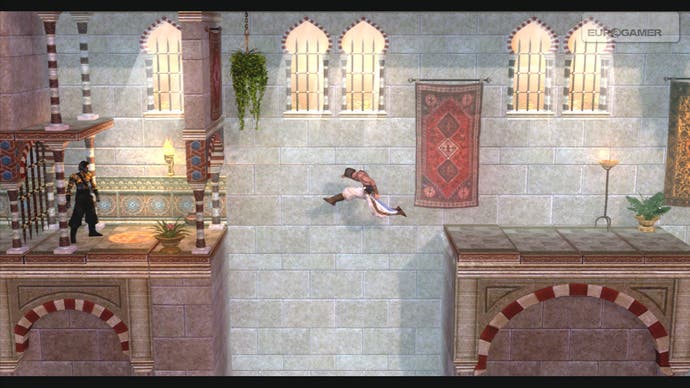Prince of Persia Classic
Fit for a king.
Chalk me up as one Xbox Live Arcade gamer that was quickly losing faith in the whole concept. Deluged with sub-par, decades-old arcade shovelware, it was getting difficult to greet any classic re-release with anything than the full 800 points' worth of contempt and despair. But perhaps things are changing. Prince of Persia Classic is a 51MB-sized slice of redemption - a comprehensive remake that honours Jordan Mechner's brilliant concept by injecting its timeless appeal into a modern-looking, highly entertaining game that's well worth its diminutive price tag.
Yes, it's had a graphical facelift, and yes, it looks and runs very nicely. But let's be honest - by all rights, visual splendour (or basic graphical competence at the very least) should be a given in the HD age of Xenos and RSX; it's in Gameloft's retooling of the gameplay where Prince of Persia Classic should be tested.
Central to this game's appeal has always been the Olympic-level athleticism of the main character and his ultra-smooth, realistic movement. With Prince of Persia Classic, the fundamental basics are unchanged in terms of the tile-based gameplay that dictates how far the Prince can jump, when he can grab on to ledges and how he'll fall to his doom. But the additions here make all the difference, with several new moves that genuinely look cool and make the action seem much faster and more fluid than the original game. Think of the rooftop chase in 007 reboot Casino Royale, based on the principles of free running, where every environmental challenge has a graceful, athletic solution. That's clearly where Gameloft wanted to take the main character, and it works a treat.

It's just a shame there are no downloadable replays, as I get the sense that watching a master run through the levels using all the moves available would look pretty sensational.
Rival Swords
The combat has also been substantially upgraded with a deceptively simple two-button swordplay system. The X button sees you attacking while A defends, but context is king here, as the effect of your button press is dependent on the state of combat itself. Perhaps the Prince will dodge an incoming strike rather than parry it, opening up a new attack possibility. Perhaps two killing blows will collide, resulting in a clash of blades. The key here is in how you to respond to every eventuality - how you read the state of play and what your next move will be. There is obviously a certain logic to it, but your instincts master the basics first and that's key to the appeal.
It's all about turning off and letting your reactions take over - the cut and thrust of Prince of Persia's combat is akin to a really satisfying extended rally in Virtua Tennis, and my only complaint is that sooner or later your own skill level eclipses the abilities of even the strongest CPU opponents. When I completed this game, I really wanted a stronger difficulty level, such was my enjoyment of the fighting and my lust for conquering more skilled opponents. But there are no such challengers, just new game modes to tackle. On the plus side, I could now cut down most of the earlier levels' opponents with a prequel Jedi's contemptuous ease - useful indeed for Prince of Persia's Time Attack and Survival modes.
The Sands of (Real) Time

These new game variations form the backbone of the game's longevity once you've completed it. Time Attack is well in keeping with the game's roots. Played out in real time, the 1989 original gave you one hour to rescue the princess before she was executed by the evil Grand Vizier Jaffar. This limitation is all-but gone in general gameplay, but it's the cornerstone of Time Attack - cliché it may be, but it is a race against the clock and the game thoughtfully gives you a ghost of your best performance to compete against should you so wish. My only criticism here is the inability to share ghosts, or download the best performances per level from Live.
Survival mode is where it's at in terms of ultra-difficulty - completing all levels without a single death requires a superhuman level of dedication. Just as it was 18 years ago, Prince of Persia is still a game where traps mean instant death and one miniscule error can blow an hour's worth of hard work. Even in normal mode, this utter ruthlessness is one aspect of the original that doesn't sit well with present-day gaming sensibilities. The addition of mid-level checkpoints helps, but sudden death is still a remarkably brutal, frustration-inducing element.

Longevity is boosted still further with the Achievements; getting your full 200 points' worth is going to take some effort. In general, they are well-paced - most of them being awarded for completing key segments of game action, such as finding your sword, beating specific opponents or completing harder puzzles. Top score is reserved for finding every potion and beating Survival Mode, but I for one liked being able to accrue decent levels of gamerscore without having to indulge in stupidly obtuse gaming chores.
It's all good news. Games like Prince of Persia and the PlayStation Store's forthcoming Super Stardust HD are strong evidence that classic gaming is finally getting the respect it deserves. Gameloft is to be congratulated and rewarded with millions of our Microsoft points for a remake that beautifully celebrates a genuine gaming legend. Add it to your Live Arcade collection alongside Jetpac Refuelled, Geometry Wars and Pac-Man Championship Edition as the most essential examples of 'retro evolved'.


